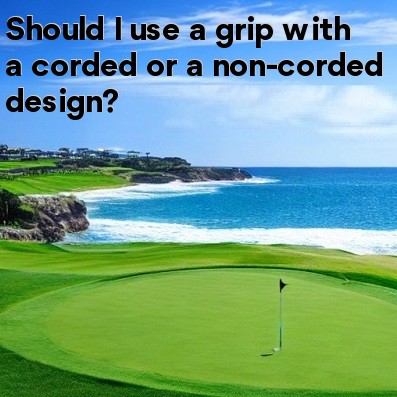
Should I use a grip with a corded or a non-corded design?
Golf grips are one of the most important aspects of the game that can greatly impact your performance. When it comes to choosing the right grip, one of the decisions you might need to make is whether to use a grip with a corded or non-corded design. Both options have their own advantages and disadvantages, so it ultimately comes down to personal preference and playing style.
- Corded Grips: Corded grips have a rough texture that provides excellent traction and control. They are popular among players who struggle with sweaty hands or play in humid conditions. The corded texture helps to channel moisture away from the grip, ensuring a secure hold on the club. Additionally, the added texture provides increased grip stability, allowing for a more consistent swing. However, some players may find the texture too rough and uncomfortable, especially for players with sensitive hands.
- Non-Corded Grips: Non-corded grips are often made of rubber or synthetic materials and offer a smooth surface. They provide a softer feel and are generally more comfortable to hold compared to corded grips. Non-corded grips also come in various sizes and shapes to suit different hand sizes and preferences. However, one downside of non-corded grips is that they may become slippery when wet or sweaty. Players who tend to have dryer hands or who play in dry climates may find non-corded grips more suitable.
Ultimately, the decision between corded and non-corded grips should be based on individual factors, such as playing style, weather conditions, and personal preference. Here are a few factors to consider when making your decision:
- Grip Size: Both corded and non-corded grips come in a range of sizes. It's important to choose a grip size that fits your hand comfortably. Grips that are too small or too big can negatively affect your swing and overall performance.
- Weather Conditions: If you frequently play in humid or wet conditions, a corded grip might be more suitable as it offers better traction and moisture control. On the other hand, if you often play in dry climates, a non-corded grip may be more comfortable and less likely to become slippery.
- Playing Style: Your playing style may also influence your grip choice. If you have a faster swing speed or prefer a firmer grip, a corded grip's rough texture can provide added stability and control. Conversely, if you have a slower swing speed or prefer a softer grip, a non-corded grip might be more comfortable.
Ultimately, it's important to try out different grip options and see which one feels the most comfortable and secure in your hands. Many golf retailers have demo clubs available for testing different grips, allowing you to make an informed decision based on your own experience. It's also worth seeking advice from a professional club fitter who can assess your swing and recommend the most suitable grip for your game.
In conclusion, whether to use a grip with a corded or non-corded design is subjective and depends on individual factors. Both options have their own advantages and disadvantages. The most important thing is to choose a grip that feels comfortable and provides the necessary traction and control to improve your game.





